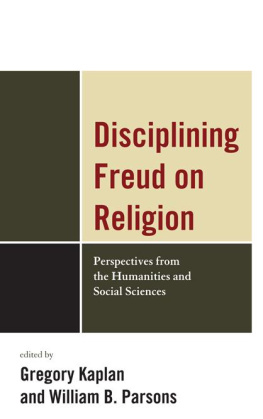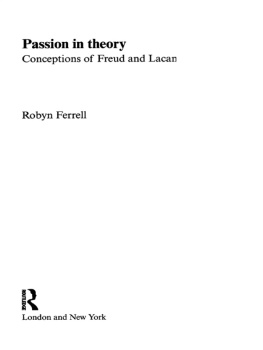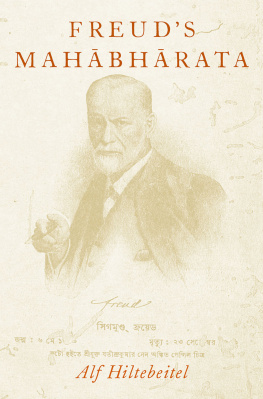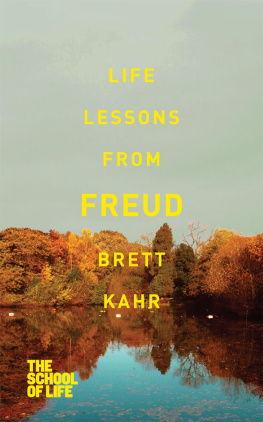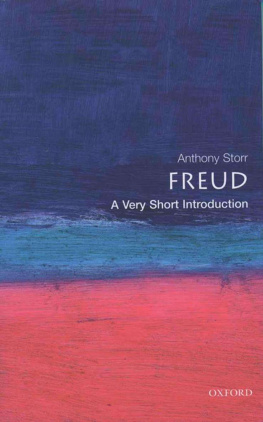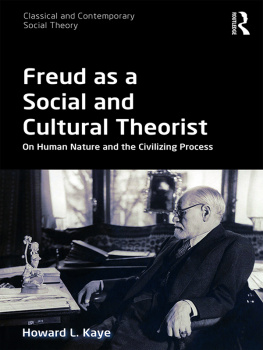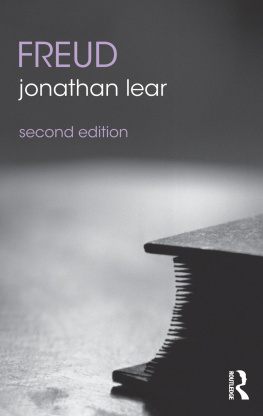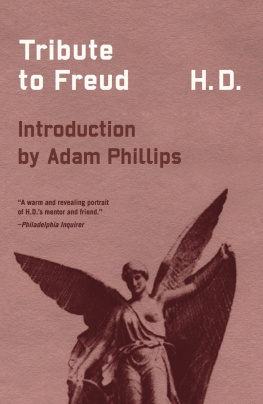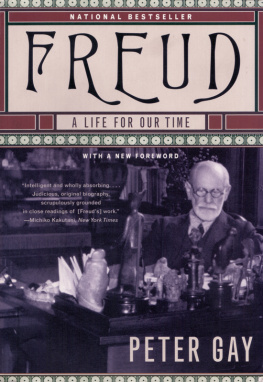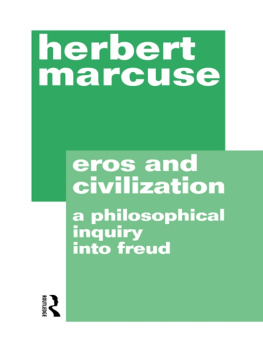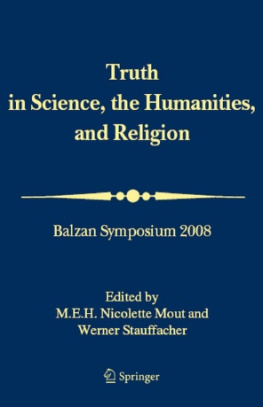Disciplining Freud on Religion
Disciplining Freud on Religion
Perspectives from the Humanities and Social Sciences
Edited by
Gregory Kaplan and
William B. Parsons
Lexington Books
A division of
rowman & littlefield publishers, inc.
Lanham Boulder New York Toronto Plymouth, UK
Published by Lexington Books
A division of Rowman & Littlefield Publishers, Inc.
A wholly owned subsidiary of The Rowman & Littlefield Publishing Group, Inc.
4501 Forbes Boulevard, Suite 200, Lanham, Maryland 20706
http://www.lexingtonbooks.com
Estover Road, Plymouth PL6 7PY, United Kingdom
Copyright 2010 by Lexington Books
All rights reserved. No part of this book may be reproduced in any form or by any electronic or mechanical means, including information storage and retrieval systems, without written permission from the publisher, except by a reviewer who may quote passages in a review.
British Library Cataloguing in Publication Information Available
Library of Congress Cataloging-in-Publication Data
Disciplining Freud on religion : perspectives from the humanities and social sciences /
edited by Gregory Kaplan and William B. Parsons.
p. cm.
Includes bibliographical references and index.
ISBN 978-0-7391-4212-7 (cloth : alk. paper) ISBN 978-0-7391-4214-1
(electronic)
1. Psychoanalysis and religion. 2. Freud, Sigmund, 1856-1939. I. Kaplan, Gregory,
1968- II. Parsons, William Barclay, 1955
BF175.4.R44D57 2010
200.92dc22 2010015505
` The paper used in this publication meets the minimum requirements of
American National Standard for Information SciencesPermanence of Paper
for Printed Library Materials, ANSI/NISO Z39.48-1992.
Printed in the United States of America
v
Introduction:
Framing Freud on Religion
Gregory Kaplan and William B. Parsons
It is well known that in formulating his general theoretical framework and views on religion Freud drew on multiple disciplines within the natural and social sciences, as well as from the humanities. It is not surprising, then, that the theory Freud gave birth to, once the province of psychology, has migrated to multiple disciplinary sites in the Academy. While the list is long, contemporary studies of Freud from such disciplinary perspectives include, for example, new biographies of Freud; sociohistorical studies of the birth of his ideas; critiques of his appropriation of the biological, neurological, and social sciences; of his views on race and gender; of his relation to philosophy, politics, culture, and ethics; relevance to pastoral education and theology; and his relation to Judaism and atheism. Each of these studies draw on methodological and theoretical advances within their respective fields to reevaluate Freud. These advances have enabled researchers to reject, accept, contextualize, and integrate selected aspects of his theories. Freud is viewed alternately as hopelessly outdated and still relevant, if not prescient.
Our volume adds to this continued multidisciplinary interest in Freud by focusing on his understanding and interpretation of, as well as his relationship to, religion. Ernest Jones famously observed that Freuds views on religion had not only provoked many books and a spate of essays, but also evoked more controversy and condemnation than any of his other writings (Jones 1957, 349). Certainly Freud on religion has continued to have as much impact on tradition and culture as any of his other provocative theses. Many of the central themes of religion that Freud addressed like ritual and obsession, Oedipus and the common man, totemism and patricide, civilization and guilt, oceanic feelings and maternal awe have been acknowledged and, as Freud would have it, worked through. Our volume adds to these voices by bringing together multidisciplinary perspectives which assess, critique, and offer new avenues of exploration for Freud on religion.
The chapters in this volume acknowledge that Freud drew on multiple disciplines (e.g., neurocognitive science, evolutionary theory, biology, anthropological and sociological thought) on formulating not simply his general theory but the application of that theory to religious phenomena. More importantly, we acknowledge that the knowledge base of these various disciplines has evolved, and that any evaluation and utilization of Freud on religion must take account of such advances. What distinguishes this volume, then, is that it strives to go beyond what is of immediate concern, namely, the impact of Freud for those in religious studies, to include perspectives from other disciplines in the humanities and sciences. It acknowledges that Freud on religion is no longer the sole province of those working in religious studies for it has migrated to diverse disciplines in the Academy. It disciplines Freud by situating his work on religion from the methodological interests and theoretical advances found in diverse disciplinary contexts. Fittingly, the contributors to this volume hail from a variety of disciplines.
In unpacking the ramifications of Freud on religion the contributors have engaged a wide variety of questions, among which are: Where do Freud and his views on religion belong in the Academy? What was Freuds relationship to religion, and how can we make sense of the many and often contradictory scholarly evaluations of him? How has the increased knowledge base within different disciplines affected the evaluation of Freud? What, if any, are the barriers involved in utilizing Freud within particular disciplines? How can Freuds views on religion be most fruitfully used within diverse disciplines to promote a more nuanced understanding of religious phenomena? Are Freuds views on religion still relevant? If not, why not, and if so, in what way?
The various responses of the contributors to these and other questions are found in three interrelated sections. Part 1 details responses to Freud on religion from scholars within the field of religious studies; part 2 offers perspectives on Freud and religion from the natural and social sciences; and part 3 engages the concerns of philosophers. In bringing together these diverse voices, this volume seeks to heighten the academic understanding of Freud on religion, with the associated aim of establishing closer and more direct interdisciplinary communication and collaboration with regard to Freud studies.
Jacob Belzen starts the proceedings by inquiring about Freuds place in religious studies. After presenting an understanding of terms like religion, religious studies and psychology, Belzen proceeds to discuss the psychology of religion, pointing out particularly its all too often forgotten interdisciplinary nature. Cultural psychology is then introduced as a preferred option within the different possible psychological approaches to religion and three variants are lined out. One example of a cultural psychological, interdisciplinary approach to the study of religion (psychohistory) is dealt with at greater length, and it is shown that psychoanalysis contributes organically to this branch of scholarship. It is argued that for this type of research departments of religious studies may at present be a more fitting niche than departments of psychology.
Diane Jonte-Pace continues the discussion by asking, What is the relation between psychoanalysis and religion? Her chapter challenges polarized perspectives claiming that Freud is either an opponent of religion or a covert defender of religion. Rather, Freud is a thinker with a deep ambivalence about religion and its loss, an ambivalence that is both personal and theoretical. His ambivalence is expressed in conflicting statements and formulations: he constructs a dominant masterplot critical of religion and a less visible counterthesis that defends religion. More importantly, however, the counterthesis opens up to an analysis of the loss of religion, generating a theory of how we mourn and fail to mourn in relation to dangers to altars. Drawing from some of Freuds texts that are rarely brought into conversation with religion, and from some contemporary psychoanalytic thinkers such as Peter Homans, Julia Kristeva, and Judith Butler, the chapter suggests that Freuds own contradictory positions on religion represent an analysis of how individuals and cultures respond to the loss of religion: Freud can best be understood as a theorist who analyzes the loss of religion in cultures and individuals by exploring the dynamics of mourning and melancholia.

